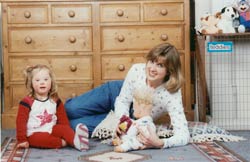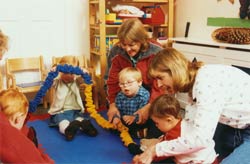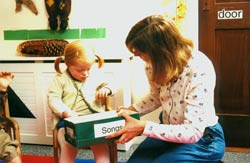Setting up a Toddler Group?
This article describes the way in which a group has been set up in Ireland by parents. The group provides support and it aims to specifically promote the children's development through structured activities.
Haig, A. (2002) Setting up a Toddler Group?. Down Syndrome News and Update, 2(3), 104-105. doi:10.3104/practice.182
There are many reasons for wanting to set up a toddler group. You may want to meet other parents with similarly aged children, you may want to have some uninterrupted time with your child, or you may want to gain some ideas of ways that you can help facilitate your child's development. For most of us, it's all of the above. There is no doubt that there is a potent energy when parents and their children get together for positive reasons. I get asked a lot about why I set up my group and how I did it. I don't think that there is any magic answer and I don't think that there is one right way to do it. I think the starting point is clarifying with yourself and the other parents involved about what you want out of the group. Why do you want to get together? If you are wanting to have time to talk to other parents and share information, then you might want to consider what measures you can take to make sure that this can happen. Perhaps you take turns 'minding the children' for a short period of time so that the other parents can chat without distractions. It doesn't matter how you do it, just make sure that you get out of it what you are looking for.

Once you have established what you want from your group, go to your community health nurse or social worker. They receive money for your child's early services. What can they do to help? Before I established my group, I approached my local state-run service provider with a request for help. Some will accommodate your needs. They might provide you with a room or professional assistance. I have found that a number of service providers offer some sort of toddler group, which is fantastic. If what they are offering meets your needs then you are in luck. It's when there is nothing on offer or it falls short of your needs that things become a bit trickier. Whatever the circumstances, I would discourage attacking service providers. I believe that we need to be assertive in stating what level of assistance we expect and then we should try to work with our service providers wherever possible to improve facilities. The thing is, while we are liaising and being assertive, the clock is ticking and our child is doing without. Personally speaking, that's when I took matters into my own hands.
I wanted my daughter to learn to take turns with children and to have a peer group with whom she could learn and interact. I was doing the one-to-one intervention, but there were a lot of important skills that I could not target with just the two of us. Besides, it's more fun for children to learn together and the adults support each other and keep the focus. Mainstream is important, but the activities offered at the toddler groups I've attended didn't provide what I wanted. So, we started out just a pair of children and a pair of parents, but soon there was a group of five children. At that point, I realized that we had a lot of strength and potential together. We all contributed monetarily and we started hiring in private therapists and buying specialist materials and equipment. The equipment is then loaned out to parents when they need it and we have access to resources that few parents would buy for their one child alone. There is always strength in numbers. But most importantly, we had a group of five children who were at a similar developmental level (very important) and I devised a developmental curriculum and led each session.
OK, I have a background in education and child development, but so do lots of people. If you want to run a group and none of the parents want or feel able to lead the group, then hire someone. Sound simple? It is. Recently I advertised in a local paper for a teaching assistant and I made it clear in the ad that our group was not-for-profit and we only needed someone part time. We had over a dozen replies, three of which were from state-qualified teachers with relevant experience! I was amazed by the response and the calibre of the respondents. No one was put off by the fact that we couldn't offer much money. My advice to you is to go for it. If you want to hire someone, advertise. If you don't ask then it won't happen. When you do hire someone, if that is what you decide to do, then link them in to the research from Down Syndrome Education International and get them trained in sign language. I would also advise that you look for someone who doesn't speak very quietly because a lot of our children have hearing difficulties. I use a microphone during our circle time to ensure that the children can hear me more clearly. You don't need to blast the children, but you do need to be aware that the majority of our young children have 'bad hearing days.'

What to look for in a toddler group leader
- Training in child development (e.g. NVQ, BTEC, NNEB)
- Experience with young children (special needs a bonus)
- Openness to learn
So, you have your group and someone to lead it. Now, what do you do in your group? Well, largely that will depend on what you want to get out of it. If you were looking to aid your child's development, I would strongly urge you to think 'holistically'. This means that you consider the whole child and not just one component of his or her development. We know that each area of development has an influence on all other areas and therefore it is difficult to isolate only one and give it sole consideration. That said, maybe you are only interested in enhancing communication skills in which case it would be entirely appropriate to give that your concentrated focus. If that is the case, please consider the child who has significant delays in this area of development and make sure that you allow him or her to feel success in the group through other means. There is nothing more soul destroying for the child and parent who see other children progress and succeed while all of their efforts seem to get nowhere. All children have strengths and it is important to recognize them. The self-confidence and esteem of the children (and parents!) is of as much importance as their skill development. When we feel good about ourselves, we learn better. I feel quite strongly about supporting a child's self-esteem; it requires careful consideration in everything that you do with children.
Once you've found someone to lead your group, what do you do? Again, that depends on what you are wanting from the group. I recommend that you cover all areas of child development which are:
- Fine motor
- Gross motor
- Language/Communication
- Cognition
- Social skills
- Self help/Independence skills
- Emotional skills
In addition, I think our children benefit from work in the areas of sensory skills (how we perceive and process information from our environment) and oral-motor skills.
Toddler groups are usually for babies to three years of age. I run my group once a week for two and a half hours and I recommend to parents that from age two they attend a mainstream group at least once a week. From three years I would recommend a mainstream playgroup for the majority of children because the research from Down Syndrome Education International indicates the social and language advances that are made in this environment. That said, my group of three year olds will continue to meet next September alongside their mainstream experiences. I didn't plan it that way; it's just what was wanted. It makes good sense, though: the benefits of good modelling from typically developing peers alongside the tailor-made activities for children with special needs.

If you do set up a group, contact the IPPA (the Early Childhood Organization) for training opportunities, insurance and advice. You can also apply to your local council and enterprise board for grants. In conclusion, I would like to share with you some Web addresses that I have found useful. I wish you and your group every success and I include my Email address in case you wish to correspond. Enjoy the magic and potential of the early years!
Useful resources
- www.dseinternational.org
- www.ippa.ie
- www.numicon.com
- www.southpawenterprises.com
- www.portageproject.org
- www.pfot.com
- www.wesco-group.com
- www.tfhuk.com
- www.nrs-uk.co.uk
- www.collinseducation.com
- www.talktoolstm.com
Ann Haig is a behavior analyst with a masters in early years education and has experience in mainstream as well as special needs education. Her early intervention group, S.K.I.P., was established in 2000.

